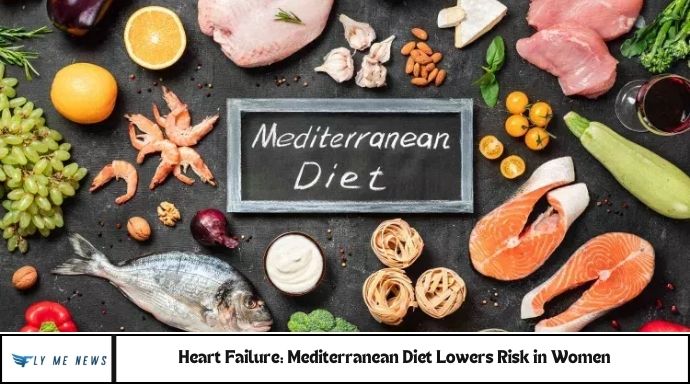Mediterranean diet can help lower heart failure risk, particularly in women Heart disease is the leading cause of death for women worldwide, and heart failure is a serious concern that can significantly impact quality of life. But what if one simple change in your diet could lower the risk? Emerging research suggests that the Mediterranean diet—rich in healthy fats, vegetables, and whole grains—can significantly reduce the risk of heart failure, particularly in women. In this article, we’ll dive into how adopting a Mediterranean diet may protect your heart and why women in particular stand to benefit from it.
Heart failure, or systolic congestive heart failure, occurs when the heart muscle weakens and is no longer able to pump blood efficiently. While it doesn’t mean the heart stops beating, heart failure is a serious, chronic condition that requires ongoing medical care.
Currently, a heart transplant is the only definitive cure for heart failure. However, individuals can often manage the condition through medications, medical procedures, and lifestyle changes.
Globally, heart failure affects an estimated 64 million people. In the United States, about 6.7 million adults over the age of 20 live with this condition, and experts predict that number will rise to 8.7 million by 2030.
The growing prevalence of heart failure is attributed to factors like aging, genetic predisposition, and unhealthy lifestyle choices. Other risk factors include ischemic heart disease, obesity, high blood pressure, diabetes, and smoking.
A 2023 study in the Journal of Cardiac Failure reported a higher rate of heart failure cases among women compared to men.
In light of these findings, a group of European scientists believes that preventive interventions can help reduce the incidence of heart failure, while improving survival and reducing hospitalizations. Their review of 682 studies indicated a strong connection between adherence to the Mediterranean diet and a reduced risk of heart failure, with particularly noticeable benefits for women.
Mediterranean diet can help lower heart failure risk, particularly in women

What is Heart Failure and Why Should Women Care?
Heart failure is a chronic condition where the heart can no longer pump blood effectively, leading to fatigue, fluid retention, and other symptoms. While heart failure can affect anyone, women are disproportionately impacted, especially as they age. According to the American Heart Association, women are more likely to develop heart failure with preserved ejection fraction (HFpEF), a condition where the heart muscle becomes stiff and fails to fill with blood properly.
Given these risks, it’s essential for women to focus on preventive strategies that support heart health. One of the most effective methods? Nutrition.
The Mediterranean Diet: A Heart-Healthy Solution
The Mediterranean diet has long been praised for its numerous health benefits, including its ability to reduce the risk of chronic diseases like heart disease, diabetes, and obesity. Key components of the Mediterranean diet include:
- Olive oil: A rich source of monounsaturated fats that promote healthy cholesterol levels.
- Fruits and vegetables: Packed with antioxidants, fiber, and vitamins.
- Whole grains: A source of fiber that aids in digestion and supports heart health.
- Nuts and seeds: Rich in healthy fats, protein, and magnesium.
- Fish and seafood: High in omega-3 fatty acids, which are crucial for heart health.
- Moderate wine consumption: When consumed in moderation, red wine can have cardiovascular benefits.
Studies consistently show that individuals who follow this eating pattern experience a significantly lower risk of heart disease. But what does this mean for women and heart failure specifically?
How the Mediterranean Diet Lowers Heart Failure Risk in Women
Several studies have demonstrated the connection between the Mediterranean diet and heart health, particularly in women. Here’s why it works:
- Lowering Blood Pressure: High blood pressure is one of the leading risk factors for heart failure. The Mediterranean diet has been shown to reduce blood pressure levels, helping protect the heart from overexertion.
- Reducing Inflammation: Chronic inflammation is a major contributor to heart failure. The anti-inflammatory foods in the Mediterranean diet, like fruits, vegetables, and fish, help reduce this risk.
- Improving Cholesterol Levels: The Mediterranean diet helps increase levels of good cholesterol (HDL) and lowers harmful cholesterol (LDL), reducing the risk of plaque buildup in arteries.
- Supporting Healthy Weight: The combination of nutrient-dense, whole foods in the Mediterranean diet aids in weight management, which is crucial for heart health, especially for women.
A study published in the Journal of the American College of Cardiology in 2020 found that women who followed a Mediterranean diet had a 25% lower risk of heart failure compared to those who did not follow this eating pattern. This supports the notion that the diet’s anti-inflammatory and antioxidant properties are particularly beneficial for women’s heart health.
Key Mediterranean Diet Foods for Heart Health
To reap the heart benefits, it’s important to focus on the following foods:
- Leafy greens: Spinach, kale, and arugula provide vitamins, minerals, and antioxidants.
- Berries: Packed with antioxidants, these fruits protect blood vessels and reduce inflammation.
- Fatty fish: Salmon, sardines, and mackerel offer omega-3s, which are essential for reducing heart disease risk.
- Legumes: Beans, lentils, and chickpeas are excellent plant-based protein sources and help lower cholesterol levels.
- Whole grains: Brown rice, quinoa, and barley are full of fiber, which supports a healthy heart.
May you also like it:
Ferrari’s Leclerc Wins US Grand Prix as Norris, Verstappen Clash
India Women Defy Rankings to Clinch Historic Bronze at Asian Table Tennis Championships
Patrick Mahomes Continues to Destroy QB Legacies: A New Era of Dominance
FAQs
Can the Mediterranean diet really lower heart failure risk in women?
Yes, studies show that the Mediterranean diet significantly reduces the risk of heart failure in women by lowering blood pressure, reducing inflammation, and improving cholesterol levels.
What foods should I eat on a Mediterranean diet?
Focus on fruits, vegetables, whole grains, healthy fats (like olive oil), fatty fish, and nuts. Avoid processed foods and excess sugar.
How long does it take to see heart health benefits from the Mediterranean diet?
Heart health improvements, such as lower cholesterol and blood pressure, can typically be seen within a few months of following the Mediterranean diet.
Is the Mediterranean diet suitable for everyone?
Yes, the Mediterranean diet is generally healthy and beneficial for most people, but it’s always best to consult with a healthcare provider before making significant dietary changes.
Can the Mediterranean diet help with weight loss?
Yes, the Mediterranean diet encourages nutrient-dense foods that can help manage weight, which is important for reducing heart failure risk.
What is the role of olive oil in the Mediterranean diet?
Olive oil is a primary fat source in the Mediterranean diet, known for its heart-healthy monounsaturated fats and antioxidants that promote cardiovascular health.
Conclusion
Incorporating the Mediterranean diet into your lifestyle is a simple yet powerful way to lower the risk of heart failure, especially for women. By focusing on nutrient-rich, anti-inflammatory foods like fruits, vegetables, fish, and healthy fats, you can protect your heart and improve overall well-being. Start small by making gradual changes to your diet, and consider consulting with a healthcare provider to tailor your approach. Your heart will thank you in the years to come!

